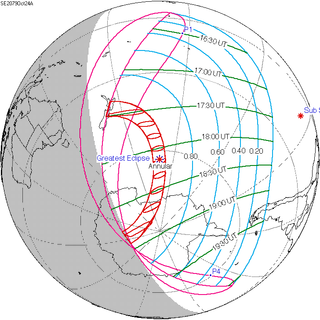Solar eclipse of October 24, 2079
| Solar eclipse of October 24, 2079 | |
|---|---|
| Type of eclipse | |
| Nature | Annular |
| Gamma | −0.9243 |
| Magnitude | 0.9484 |
| Maximum eclipse | |
| Duration | 219 s (3 min 39 s) |
| Coordinates | 63°24′S 160°36′W / 63.4°S 160.6°W |
| Max. width of band | 495 km (308 mi) |
| Times (UTC) | |
| Greatest eclipse | 18:11:21 |
| References | |
| Saros | 154 (10 of 71) |
| Catalog # (SE5000) | 9686 |
An annular solar eclipse will occur on Tuesday, October 24, 2079. A solar eclipse occurs when the Moon passes between Earth and the Sun, thereby totally or partly obscuring the image of the Sun for a viewer on Earth. An annular solar eclipse occurs when the Moon's apparent diameter is smaller than the Sun's, blocking most of the Sun's light and causing the Sun to look like an annulus (ring). An annular eclipse appears as a partial eclipse over a region of the Earth thousands of kilometres wide.
Related eclipses[edit]
Solar eclipses 2076–2079[edit]
This eclipse is a member of a semester series. An eclipse in a semester series of solar eclipses repeats approximately every 177 days and 4 hours (a semester) at alternating nodes of the Moon's orbit.[1]
| Solar eclipse series sets from 2076 to 2079 | ||||
|---|---|---|---|---|
| Ascending node | Descending node | |||
| Saros | Map | Saros | Map | |
| 119 | June 1, 2076 Partial |
124 | November 26, 2076 Partial | |
| 129 | May 22, 2077 Total |
134 | November 15, 2077 Annular | |
| 139 | May 11, 2078 Total |
144 | November 4, 2078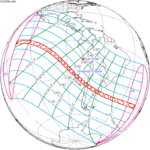 Annular | |
| 149 | May 1, 2079 Total |
154 | October 24, 2079 Annular | |
Tritos series[edit]
This eclipse is a part of a tritos cycle, repeating at alternating nodes every 135 synodic months (≈ 3986.63 days, or 11 years minus 1 month). Their appearance and longitude are irregular due to a lack of synchronization with the anomalistic month (period of perigee), but groupings of 3 tritos cycles (≈ 33 years minus 3 months) come close (≈ 434.044 anomalistic months), so eclipses are similar in these groupings.
| Series members between 1901 and 2100 | |||
|---|---|---|---|
 March 6, 1905 (Saros 138) |
 February 3, 1916 (Saros 139) |
 January 3, 1927 (Saros 140) | |
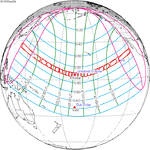 December 2, 1937 (Saros 141) |
 November 1, 1948 (Saros 142) |
 October 2, 1959 (Saros 143) | |
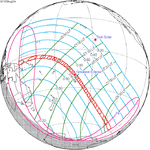 August 31, 1970 (Saros 144) |
 July 31, 1981 (Saros 145) |
 June 30, 1992 (Saros 146) | |
 May 31, 2003 (Saros 147) |
 April 29, 2014 (Saros 148) |
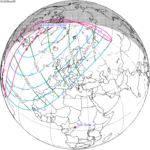 March 29, 2025 (Saros 149) | |
 February 27, 2036 (Saros 150) |
 January 26, 2047 (Saros 151) |
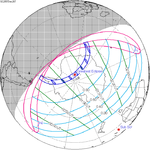 December 26, 2057 (Saros 152) | |
 November 24, 2068 (Saros 153) |
 October 24, 2079 (Saros 154) |
 September 23, 2090 (Saros 155) |
|
Metonic series[edit]
The metonic series repeats eclipses every 19 years (6939.69 days), lasting about 5 cycles. Eclipses occur in nearly the same calendar date. In addition, the octon subseries repeats 1/5 of that or every 3.8 years (1387.94 days). All eclipses in this table occur at the Moon's descending node.
| 21 eclipse events between June 1, 2011 and June 1, 2087 | ||||
|---|---|---|---|---|
| May 31 – June 1 | March 19–20 | January 5–6 | October 24–25 | August 12–13 |
| 118 | 120 | 122 | 124 | 126 |
 June 1, 2011 |
 March 20, 2015 |
 January 6, 2019 |
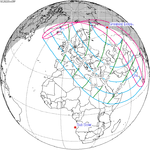 October 25, 2022 |
 August 12, 2026 |
| 128 | 130 | 132 | 134 | 136 |
 June 1, 2030 |
 March 20, 2034 |
 January 5, 2038 |
 October 25, 2041 |
 August 12, 2045 |
| 138 | 140 | 142 | 144 | 146 |
 May 31, 2049 |
 March 20, 2053 |
 January 5, 2057 |
 October 24, 2060 |
 August 12, 2064 |
| 148 | 150 | 152 | 154 | 156 |
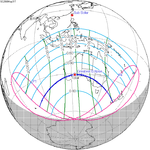 May 31, 2068 |
 March 19, 2072 |
 January 6, 2076 |
 October 24, 2079 |
 August 13, 2083 |
| 158 | 160 | 162 | 164 | 166 |
 June 1, 2087 |
 October 24, 2098 |
|||
References[edit]
- ^ van Gent, R.H. "Solar- and Lunar-Eclipse Predictions from Antiquity to the Present". A Catalogue of Eclipse Cycles. Utrecht University. Retrieved 6 October 2018.
External links[edit]
- Earth visibility chart and eclipse statistics Eclipse Predictions by Fred Espenak, NASA/GSFC

